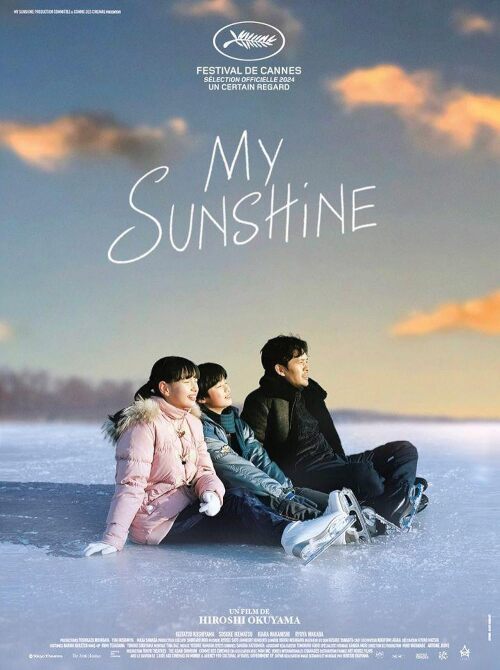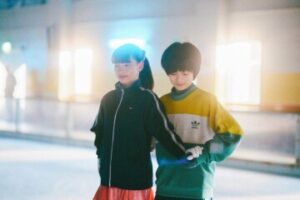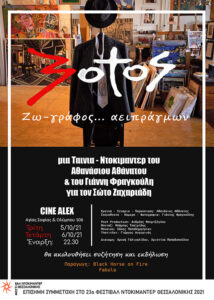MY SUNSHINE
Οκτ 22, 2024 Κινηματογράφος 0

FILM CRITICS
BOKU NO OHISAMA
My sunshine: writes Giannis Fragoulis
We saw the film “My Sunshine”, by Hiroshi Okuyama, at the Athenaeon Cinema. A film that takes us into the psyche of the human being, the teenager, the father and the mother. It tells us about love and about the prejudices that still plague people, those who try to live in harmony in this society.
My sunshine: The story
On an island in Japan, idle life revolves around the changing of the seasons. The coming of winter means it’s time for ice hockey at school, but little Takuya is not at all enthusiastic about the idea. His real interest is focused on Sakura, a rising figure skating star from Tokyo, who captivates him with her skills on the ice. The coach and former champion Arakawa notices Takuya’s talent and decides to train him and Sakura for an upcoming skating competition.
As winter persists, these three characters bond in a strong, effortless, harmonious friendship. But eventually the snow will melt, things will take an unexpected turn, and their friendship will be threatened. Just 28-year-old director Hiroshi Okuyama, who won the New Directors Award at the San Sebastian Film Festival at the age of 22 with his debut feature, “Jesus,” returns with a coming-of-age story -true elegance- to confirm his status as one of the most remarkable young talents in Asian cinema.
My sunshine: The characters
We are following the life of Takuya. We see his development, his attitudes in his family, at school, in skating and hockey. The whole film “My sunshine” is focused on the lives of the three main characters. Through them we see the life and perceptions of the local society, in Japan. The film does not specify the time of the narrative. The place is also not specified precisely. One would say that the place and time is something that the viewer will determine. Consequently, the characters and narrative is something that is shaped through the ideological and personal filter of the viewer.
What is left open for any interpretation is the tic of the protagonist? In the film he gives us a few keys: the first is that the teenage Takuya cannot comfortably express the first letter, he repeats it a few times before uttering the first word of each sentence. His father does the same. In his family, the mother is the one who arranges what happens. She acts sternly at times, arranging her son’s life. He hesitates, hesitates to express himself freely, as he hesitates when he starts to utter the first word of a sentence. Where he lets himself go is in skating.

My sunshine: The enjoyment
His sporting activities are ice hockey and baseball. But he is attracted to skating. Why? We’ll see that he is dumbfounded to see the teenage Sakura dancing when she skates. We understand that it is teenage love that gives him pleasure. He can, thus, more easily perceive what is becoming, reality, and thus form his identity. It is not possible to heal the maternal trauma, but it can heal it. In the film “My sunshine” we see this view of psychoanalysis “regulating” the narrative. We will see the resolution of the tragic part later. In the title song we are given the key to solving the riddle of Takuya’s tic.
The third central character is the skating instructor, Arakawa, a former champion in that sport. He sees that Takuya has a passion for skating and makes it easy for him to learn it. He lends him the skates and joins him in the lesson as Sakura’s partner. But Sakura suspects that he has homosexual tendencies and keeps her distance. As a result, he is cut off from the class and goes solo. And this is where the mother, this time Sakura’s mother, comes into play.
My sunshine: The dreamy
It is obvious that “My sunbeam” describes a matriarchal society that is conservative. The teacher leaves as a foreign body, but he leaves his mark on the young Takuya, more specifically his enjoyment of love, which is revived, at the end of the film, when the two teenagers see each other again.
The teaching of the actors was such that the characters and their transitions were very well portrayed. The three actors portrayed the characters accurately, aided by the supporting roles that supported their development, especially Takuyas’ young friend. The photography indoors is excellently structured, outdoors is relatively overlit, suggesting a dreamscape, hence Takuya’s trauma that is healed indoors, at the skating rink.
What we should see is that the teenage child manages to overcome his grip, tics and restraint through art. Figure skating -not hockey and baseball- is the translation of reality, as Joulia Kristeva states in her view of art. There we will see the repressed psyche of the child and its way of escape. The film ends with a sunbeam and the song that interprets it all, giving some explanations.
MY SUNSHINE
(BOKU NO OHISAMA)
Directed by: Hiroshi Okuyama
Writing: Hiroshi Okuyama
Cinematography: Hiroshi Okuyama
Editing by: Tina Baz
Music: Humbert Humbert
Cast: Keitatsu Koshiyama (Takuya), Kiara Takanashi (Sakura), Sôsuke Ikematsu (Arakawa), Ryûya Wakaba (Igarashi), Maho Yamada, Yunho
Produced by: Toshikazu Nishigaya, Masa Sawada
Year: 2024
Countries of origin: Japan, France
Language: japanese
Color: Color
Genres: Drama, Sport
Runtime: 100 minutes
More information on casting and technical information.
Check out the videos we’ve created
Σχετικά άρθρα
-
 ΕΠΙΣΤΡΟΦΗ ΣΤΗΝ...
ΕΠΙΣΤΡΟΦΗ ΣΤΗΝ...Μαρ 26, 2025 0
-

-
 ΤΕΛΕΥΤΑΙΑ ΠΝΟΗ
ΤΕΛΕΥΤΑΙΑ ΠΝΟΗΦεβ 26, 2025 0
-
 ΘΟΛΟΣ ΒΥΘΟΣ
ΘΟΛΟΣ ΒΥΘΟΣΦεβ 18, 2025 0
Στην ίδια κατηγορία
-
 ΤΑΙΝΙΕΣ ΑΠΟ ΤΙΣ...
ΤΑΙΝΙΕΣ ΑΠΟ ΤΙΣ...Απρ 03, 2025 0
-
 Ο ΓΥΡΟΣ ΤΟΥ ΚΟΣΜΟΥ...
Ο ΓΥΡΟΣ ΤΟΥ ΚΟΣΜΟΥ...Απρ 02, 2025 0
-
 ΜΙΑ ΓΥΝΑΙΚΑ...
ΜΙΑ ΓΥΝΑΙΚΑ...Μαρ 29, 2025 0
-
 ΦΕΣΤΙΒΑΛ ΓΑΛΛΟΦΩΝΟΥ...
ΦΕΣΤΙΒΑΛ ΓΑΛΛΟΦΩΝΟΥ...Μαρ 25, 2025 0
Αναζήτηση
-
 WONDER WOMAN
WONDER WOMANΙούν 09, 2017 138
-
 ΠΑΙΔΙΚΗ ΣΚΗΝΗ
ΠΑΙΔΙΚΗ ΣΚΗΝΗΟκτ 12, 2014 2
-
 ΚΛΗΡΩΣΗ ΠΡΟΣΚΛΗΣΕΩΝ
ΚΛΗΡΩΣΗ ΠΡΟΣΚΛΗΣΕΩΝΜαρ 22, 2014 2
-
 ΔΥΟ ΜΕΡΕΣ, ΜΙΑ ΝΥΧΤΑ
ΔΥΟ ΜΕΡΕΣ, ΜΙΑ ΝΥΧΤΑΝοέ 13, 2014 2
-
 ΑΧΙΛΛΕΑΣ ΨΑΛΤΟΠΟΥΛΟΣ
ΑΧΙΛΛΕΑΣ ΨΑΛΤΟΠΟΥΛΟΣΝοέ 09, 2014 2
-
 ISTABUL FILM FESTIVAL
ISTABUL FILM FESTIVALΜαρ 08, 2014 2
-
 ΤΑΙΝΙΕΣ ΑΠΟ ΤΙΣ ΤΑΙΝΙΟΘΗΚΕΣ
ΤΑΙΝΙΕΣ ΑΠΟ ΤΙΣ ΤΑΙΝΙΟΘΗΚΕΣΑπρ 03, 2025 0
-
 Ο ΓΥΡΟΣ ΤΟΥ ΚΟΣΜΟΥ ΤΟΥ ΜΙΚΡΟΥ ΓΚΡΙΖΛΙ
Ο ΓΥΡΟΣ ΤΟΥ ΚΟΣΜΟΥ ΤΟΥ ΜΙΚΡΟΥ ΓΚΡΙΖΛΙΑπρ 02, 2025 0
-
 ΗΛΙΟΣ ΜΕ ΔΟΝΤΙΑ
ΗΛΙΟΣ ΜΕ ΔΟΝΤΙΑΑπρ 02, 2025 0
-
 ΠΑΓΚΟΣΜΙΑ ΗΜΕΡΑ ΘΕΑΤΡΟΥ
ΠΑΓΚΟΣΜΙΑ ΗΜΕΡΑ ΘΕΑΤΡΟΥΜαρ 29, 2025 0
-
 ΜΙΑ ΓΥΝΑΙΚΑ ΕΞΟΜΟΛΟΓΕΙΤΑΙ
ΜΙΑ ΓΥΝΑΙΚΑ ΕΞΟΜΟΛΟΓΕΙΤΑΙΜαρ 29, 2025 0
-
 ΕΠΙΣΤΡΟΦΗ ΣΤΗΝ ΠΑΤΡΙΔΑ
ΕΠΙΣΤΡΟΦΗ ΣΤΗΝ ΠΑΤΡΙΔΑΜαρ 26, 2025 0

Δείτε το τρέιλερ της ταινίας μας, που συμμετέχει το Φεστιβάλ Ντοκιμαντέρ Θεσσαλονίκης.
SOTOS, EVERLASTING PAINTER (TRAILER)
Youtube
Επικοινωνήστε
ΓΙΑΝΝΗΣ ΦΡΑΓΚΟΥΛΗΣ
Email: info@filmandtheater.gr
Τηλ: (+30) 6974123481
Διεύθυνση: Ιωαννίνων 2, 56430, Σταυρούπολη Θεσσαλονίκη
![]()

